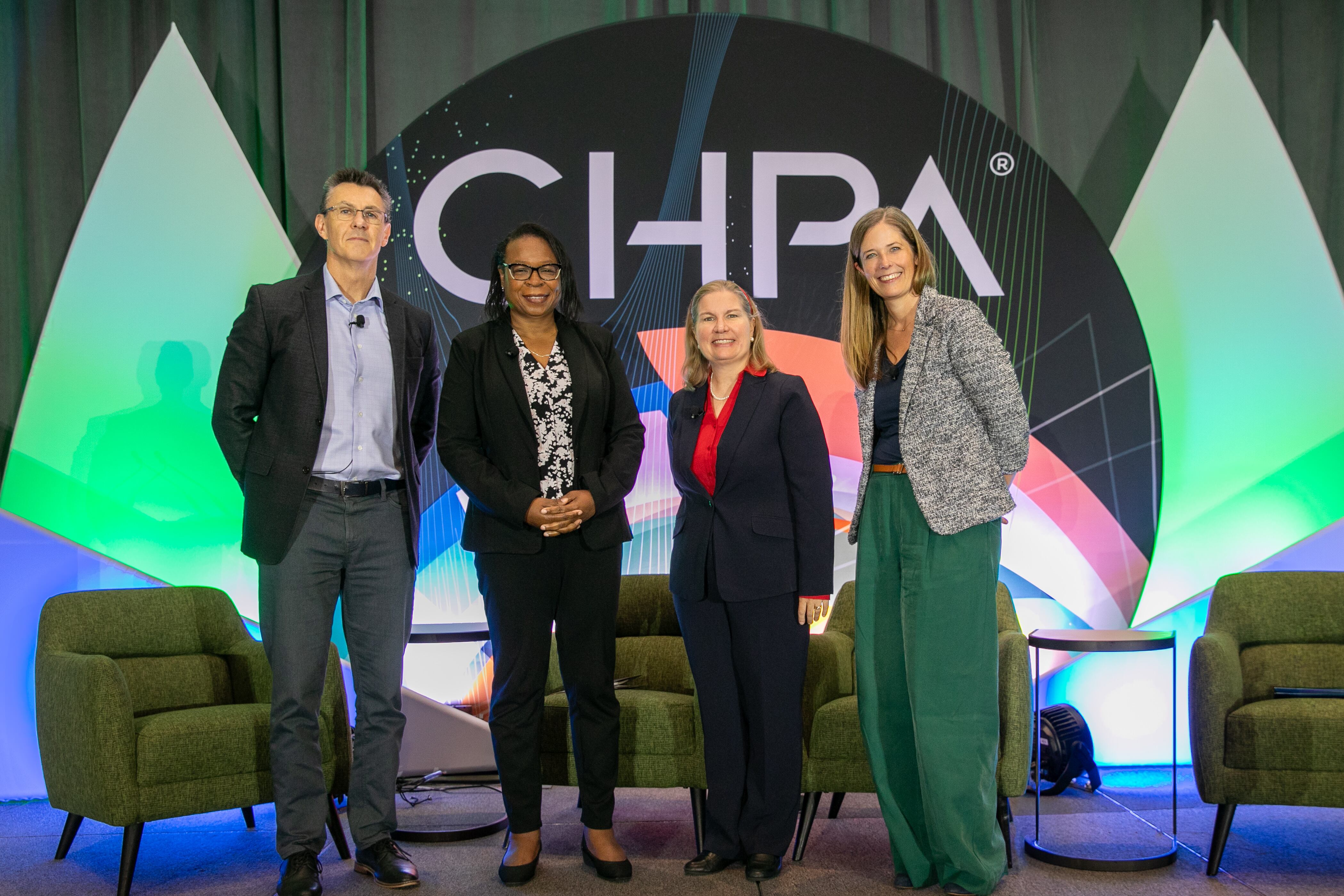Industry from all corners of the consumer selfcare space recently gathered in Bethesda, MD for the Consumer Healthcare Products Association’s (CHPA) Regulatory, Scientific, and Quality (RSQ) Conference.
The event culminated with a U.S. Food and Drug Administration (FDA) Leadership panel featuring Theresa Michele, M.D., director, Office of Nonprescription Drug Products (ONDP); Cara Welch, PhD, director of the Office of Dietary Supplement Programs (ODSP); and Vinetta Howard-King, acting deputy associate commissioner for Medical Products in the Office of Inspections and Investigations (OII). The panel was moderated by Glen Murphy, senior director of regulatory affairs, Kenvue and 2025 RSQ conference planning committee chair.
On the dietary supplement front, Dr. Welch delved into the efforts put into reorganizing FDA’s Human Foods Program (HFP), noting the redesign was less about “moving boxes around” and more so “forming new boxes” altogether. She unpacked many of those boxes during her time on stage. From inspections to stakeholder engagement to leveraging third-party audit data and AI, one key theme emerged: collaboration—internally and externally.
Inside FDA, Dr. Welch said the agency is placing emphasis on leveraging expertise across all programs and reassessing how the various activities in the wider “super office,” known as the Office of Food Chemical Safety, Dietary Supplements and Innovation (OFCSDSI) programs can join forces and be better aligned. Outside of the FDA, Dr. Welch expressed receptiveness to collaboration among trades, the wider industry and third-party data sources.
Finalizing NDIN guidance
Dr. Welch went on to detail many of the ODSP’s priorities, highlighting issues such as stakeholder engagement and strengthening ingredient regulation, including guidance on New Dietary Ingredient Notifications (NDINs), something she said they are making progress on.
“A New Dietary Ingredient Notifications is FDA’s only opportunity to review the safety of ingredients before they show up in a dietary supplement,” Dr. Welch said. “So making the most of the program is really important to my office. We are making progress on finalizing the guidance.”
The FDA is on track to receive between 70 and 80 NDINs this year, which is significantly up on the annual average of 40 to 50, she said.
“The idea of improving review is because our reviewers are dealing with an influx of notifications,” she added. “This is not a bad thing, we welcome them, but we really want to make sure that we can give each notification the appropriate level of review that is needed.”
Forging bonds with inspectors
The ODSP is also looking to improve inspectional coverage by maximizing resources and fostering rapport with inspectors.
“We have been focused on a closer relationship with investigators of dietary supplements,” Dr. Welch said. “I think it’s really good to ensure that they understand where we want them to focus their time and their effort. When an investigator walks into a facility, do they know what type of facility they’re walking into? Do they know the types of operations that are being done in that facility? Do they know the types of dosage formats they’re walking into or the types of ingredients they might be using? And we want to be a resource for an investigator.”
Given the breadth of the dietary supplement industry, Dr. Welch said the investigator’s testing capabilities have to be broad, from inspecting simple botanical tea to dozens of distinct chemicals in a gummy format.
“We want to be a resource for them, but we also want to set them up for success,” she said.
Data collection: Leveraging third-party audit data and AI
Leveraging third-party audit data is something Dr. Welch hopes to make progress on in the next year.
“There’s a lot of data out there and that’s something we’re definitely seeing from this administration,” she said. “How to take the data that’s out there and apply it into useful information and what can we do with that information? Can we inform risk prioritization? It’s not going to take the place of an inspection or third-party audit, but maybe it could improve how prioritized an inspection could be. So there’s a lot of possibilities out there, I’m excited to see where this all goes.”
When probed on what exactly this would entail, Dr. Welch said she is still exploring what this could look like, adding that she is open to engaging with other regulators or third-party non-regulators.
“There’s a lot of information out there,” she said. “There’s a lot of people, auditors and certifiers who are in facilities. What is the credibility of that data? How can we apply it to FDA systems? There’s a lot of potential there and sort of turning it into a program or actual activity. I think there’s a lot of work yet to go, but I think it’s a good direction that we’re headed. It’s, again, sort of maximizing the resources that are available.”
The openness to outside data is a departure from Dr. Welch’s stance last year. During the 2024 CHPA RSQ, NutraIngredients asked whether FDA would consider utilizing Amazon’s product database as a Mandatory Product Listing by proxy.
“There are a lot of ways to think creatively, but I think we also need to remember that sort of a collaboration, particularly with a private entity, you want to proceed carefully because I think the success of a product listing, a dietary center listing program would be that FDA own that information, it has to be an FDA database, to make sure that it fits in with all of our other databases,” she said at the time.
“Certain e-retailers or platforms play a role. And I think that’s really important to understand the role that they play versus the role that FDA plays…So we appreciate the efforts that have been put in place by other platforms, but I would say product listing is really best within FDA.”
Fast forward to this year, Dr. Welch said FDA is “happy to engage with other regulators or third-party non-regulators because the data is applicable, even if it’s not from a government source.”

Invested in AI
At the 2024 CHPA RSQ, Dr. Welch also said she was exploring the use of artificial intelligence. This year, NutraIngredients asked her whether the use of AI has moved beyond the exploratory phase and if it could be used to help with auditing data or MPLs for example.
“AI is such a hot topic right now,” she said. “FDA of course is fully invested in maximizing where and how we can use AI. So in that respect, absolutely.”
In terms of utilizing AI to turn products into a reliable listing database, “that’s something absolutely of interest,” she said. “I do want to continue looking into that. Of course, many products are out there in the public sphere. It’s just taking what’s all out there and pulling it into something that’s digestible and usable on our end.”
The Dietary Supplement Label Database (DSLD), developed by the ODS at the National Institutes of Health (NIH), is what FDA currently relies on the most.
“It is a great database, to be clear, but I think everyone recognizes it is not complete,” Dr. Welch said. “Even if we were to build our own database through web scraping, it still would not be complete, so I think it’s just understanding all the information that’s out there, and then [figuring out] how do we apply it to our program.”
Stakeholder engagement
Four trade associations representing the dietary supplement industry recently penned a joint letter to two Deputy Commissioners that laid out how they believe reform could be achieved without requiring any action by Congress. The solutions, they say, would streamline regulations, reduce legal uncertainties and support industry innovation and consumer safety through clearer standards and documentation.
Referencing the letter, which Dr. Welch was CC’d on, she said: “That’s the type of engagement we’re really looking for. What are some opportunities where industry’s interests and FDA’s interests align? Let’s take advantage of that and see what we can move forward on. That’s exactly the type of engagement we’re looking for.”
When asked by NutraIngredients which proposed solutions she thought would be most achievable, Dr. Welch declined to comment, stating “It’s probably best that we respond to the trades first.”
Sticking to the theme of leveraging connections, Dr. Welch acknowledged that sometimes FDA relies on the dietary supplement industry’s expertise, pointing to productive engagement with CHPA to better understand the complexities involved in manufacturing and testing gummy formats.
“I think there’s a lot of great opportunities for my office to learn from the industry,” Dr. Welch said. “We’re only about 40 employees, so sometimes we just don’t have all of the expertise, but having the relationships and being able to learn from those of you who are actually dealing with this regularly has been really beneficial on our end.”



